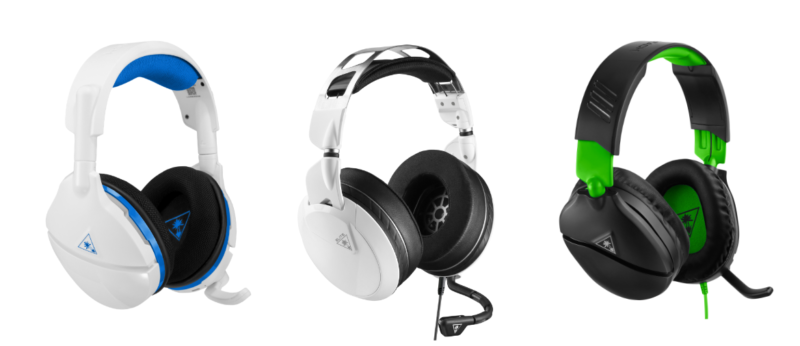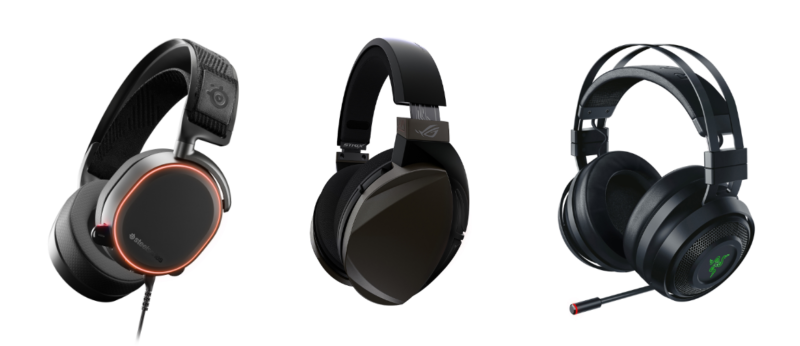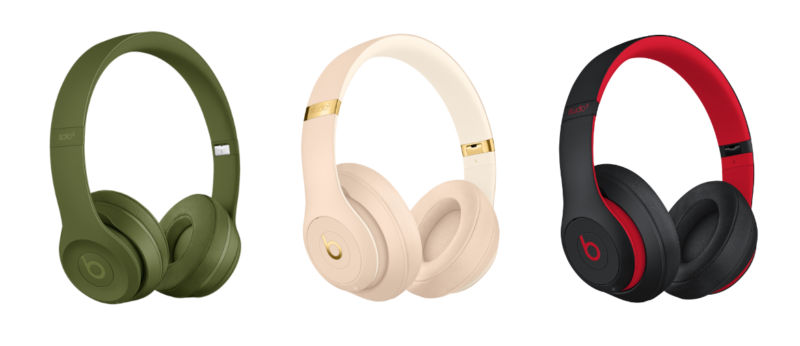It is a golden age for gamers. Not only are there great new games released every week, from inventive indies to AAA epics, but there has never been a better time for hardware. Nowhere is this more obvious than in gaming headset technology.
No more, will you be dependent on your TV or monitor’s speakers! No longer, will you have to strain to hear your teammate and opponent’s crackled voices. And the days of being weighed down from above by clunky, badly designed cans are behind us, gathering dust along with Xbox Kinects and PlayStation Move controllers!
The only downside is the dilemma of choice.
Ideally, the headset you choose should be a balance of budget, your specific gaming habits and your own little preferences and quirks.
Here’s our guide to the features, qualities and details to look out for when choosing the right headset for you.
Gaming Headsets on a Budget
You can pick up a perfectly functional set of cans without breaking the bank (brands like Turtle Beach specialise in entry level gaming headsets starting at the €20 mark), or you can buy what the professionals use and spend in the region of €400. Like any product, you get what you pay for.

Pricier headsets have (as you’d expect) better sound quality and brand name recognition. But they also boast less immediately obvious benefits. These include warranties, weight balance (more on that later) and ergonomic design. As an example, Steel Series are considered among the best high-end gaming headsets.
However, you might not want to throw a lot of money at your gaming audio. Different types of headsets benefit different kinds of gamers, so you might be paying for benefits you don’t really use: Single player gamers might not value a good microphone, for instance. This will also be discussed in more detail below.
Do You Play Multiplayer or Single Player?
One of the biggest gaming trends of recent years has been the rise of the online multiplayer game. Yes, they date back to Halo and World of Warcraft, but games like Fortnite, The Division and PUBG have exploded the genre; and other titles are edging more and more into multiplayer territory, with some gamers not even bothering to play the Call of Duty single player campaigns.
If you’re a gamer who prefers single-player campaigns, or one who doesn’t chat while playing multiplayer, then you might not be concerned about a good microphone. Comfort and sound quality should take priority in your headset.
If, however, you live for co-op and chatting to your teammates (and opponents), mic quality should be high on your list.
What to Look for in Microphones
For gamers who engage in chatter or Skype calls, noise-cancelling microphones are important. These should cut out as much ambient background (i.e. non-game) noise as possible.
You might see the terms “omnidirectional” and “unidirectional” used for microphones. The former means that it takes in and broadcasts sounds from all directions; while the latter just takes it from a specific direction.
If you want a headset that you can use for a variety of purposes – for instance single-player gaming or just listening to music – you might want a discrete or detachable mic.
Gaming System Compatibility
A major consideration is whether you’ll be able to use your shiny new headset on your preferred gaming system!
Some headsets are compatible across multiple devices, while some are specific to a console, Mac or PC. A headset with a traditional jack should be audio-compatible with most consoles (PS4 and Xbox One controllers have a socket for a traditional jack), phones and PCs.
However, while many headsets have an audio jack that’s compatible across numerous devices, the microphone may not be.
Here is a handy selection of gaming headsets which are compatible with each of the major gaming system:
It’s also worth noting that some newer devices – especially certain next gen smartphones – are abandoning the headphone jack altogether. And, if you’re a Mac gamer, Apple products aren’t as compatible with headphones as PCs and Androids tend to be.
Check whether your device is compatible with:
- USB (wired or wireless) – these are suited to PC gamers
- Jack (3.5mm or dual 3.5mm) – compatible on an audio level with most PCs, gaming consoles and mobile devices
- Bluetooth – most PCs, consoles and mobile devices
There’s also software and installation to consider if you’re a PC gamer, so it’s good to be aware of the drivers or software that might need to be installed and whether the headset is compatible.
What’s Best, Wireless or Wired?
Many gamers prefer wireless gaming headsets. As controllers became wireless, headsets soon followed suit. Obviously, it offers more flexibility, especially if you become animated during an especially intense game!
Wireless headphones also tend to be much more compact and portable. This isn’t just due to the lack of a cord, but because wireless ones are often foldable too.
 Headphones without wires are arguably future-proofed against future smartphones, as some phone manufacturers are getting rid of the traditional headphone jack.
Headphones without wires are arguably future-proofed against future smartphones, as some phone manufacturers are getting rid of the traditional headphone jack.
However, if you don’t mind a cord, then that broadens the kinds of headsets you can buy, and they tend to be more affordable. Plus, on the low to mid-price headsets, wired ones can offer superior sound quality, without the far of connectivity issues.
Also, for some (though not all) PC gamers, wireless headphones are less of an issue, as PC gamers often play at a desk. If that’s the case, the gamer will already be close to the PC, monitor, keyboard, mouse and a connection point for the headset.
Another consideration is battery life, which is an issue for wireless headphones.
How Long Should the Batteries Last?
A good battery gives you headspace: You don’t have to charge too frequently, so you don’t have to worry about your headset cutting out mid-session. Plus, you don’t have to monitor how long you’ve got every time you power up your video game console or PC.
The least you should hope for when buying a decent gaming headset is the duration of a full gaming session per-charge – so 10 hours. There is a bit of give and take, in that a high-powered headset might eat up some battery life. That said, some of the higher end models can last 20-30 hours.
If you’re organised – and you’re not using it for an especially long journey – battery life shouldn’t be too much of an issue.
Sound Quality
A generally high-quality headset will have a satisfying sound quality. That said, this issue is more complex and varied than you might imagine, so let’s look at sub-categories:
Clarity
Some brands opt for clarity of sounds above all else. While this seems like a no-brainer, clarity can mean compromising on volume: This is because sounds can become more distorted the louder the game’s audio becomes. So, some headsets promoting clarity might have a lower maximum volume than competitors.
There is also a debate of clarity versus “warmth”. Audio that’s too precise can sound too manufactured or artificial. Again, this is a very subjective consideration which depends on personal taste.
Bass
A strong bassy sound can lead to a satisfying gaming experience, especially in combat games. As you might expect, this compromises on clarity and precision of sound. So, for example, stealth games or dialogue-heavy RPGs might not benefit from a heavy bass sound.
EQ/Equalizer
This is a great feature available on some headsets, most commonly on PCs. An equalizer allows you to adjust the sound levels to your preference.
Surround Sound
Technically, this can be achieved by all headphones, but there are differences from brand to brand. Some have a more subtle effect; while others are more bombastic, and others again create the illusion of sound coming from various directions. In fact, some models offer variations on the surround sound to choose from.
Weight and Comfort
One of the biggest challenges with a good headset is combining quality with a comfortable weight. Thankfully, this has evolved significantly in the past decade and the general standard for ergonomics and comfort is high.

If headphones are used just for audio (for instance, the Beats by Dre range), weight is less of an issue because you likely won’t be wearing them for as long. This applies to gamers on their commute too, squeezing in some last minute Stardew Valley before their stop. However, a FIFA session or a play-through of a few Assassin’s Creed missions might last eight hours, so the cumulative effect of the headphones’ weight will be felt!
A suspension and/or padded headband is common on headsets these days. These are worth looking out for if you’re planning some long gaming sessions.
Do you wear glasses?
Some headsets are designed to be worn with glasses; some are not specifically but are the preferred choice of glasses-wearers; while some are not ideal for glasses-wearers.
If in doubt, look at headset reviews that talk about how heavy they feel at the sides, and how many wires or bands they have.
In other words, the ideal headset for those wearing glasses have low-pressure on the sides, are wireless and don’t tend to tangle.
Materials
You’ll see materials listed in some headset’s specifications. These tend to be relevant from a comfort point of view. Leather is a common, popular material for headphones, but some find it a little too constricting and warm. If you’re concerned about the weight of the headset, try to find a pair with a soft, padded top.
Spare Parts / Repairs
This will depend on your lifestyle: If you expect some wear and tear, you might be interested in headsets’ spare parts. In fact, some headsets even have them included in the original packaging. Some other headsets are warrantied (within reason – don’t jump on them!). And some popular headsets have mail-order parts or are part of the repair/reuse ecosystem, so it wouldn’t be hard to find someone who can repair them.
However, you might be a gamer who takes meticulous care of your gear, in which case spare parts and repairs would prove less of an issue.
Ready, Player One?
As mentioned above, no is a super time for anyone interested in good gaming hardware. Affordable, quality equipment – from controllers to headsets and beyond – has never been more easily available and affordable.
Find the headset that’s right for you in the Very gaming section.

